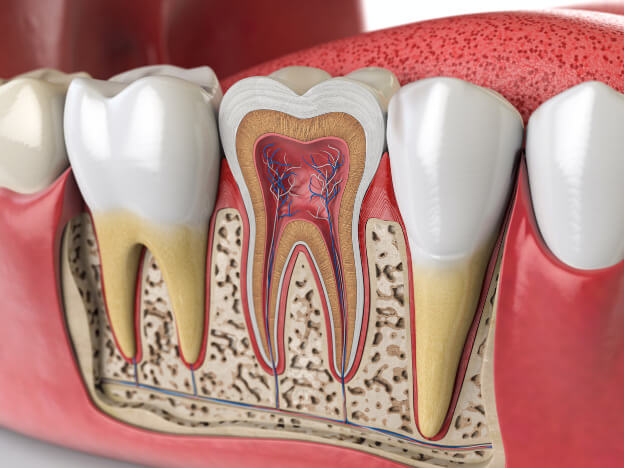Root Canal Therapy
Root Canal Therapy
Root canal therapy is also known as endodontic therapy, and it is necessary when the pulp of your tooth has been damaged. The pulp is the internal part of your tooth that consists of nerve and blood vessels housed within a canal chamber.
When the canal system becomes infected due to tooth decay, trauma, or deep restorations, it may be necessary to perform endodontic therapy. You’ve likely heard horror stories about how painful such therapy can be, but with careful administration of a local anesthetic and proper aftercare, that won’t be a problem.
How is a Root Canal Done?
After administering anesthesia, your endodontist will make a small opening in the top of your tooth. Through that opening, they will remove the infected pulp from the root of your tooth.

Following the removal of the infected part, they will use small shaping files and antibacterial rinses to disinfect the remaining tooth structure. This may take several visits to complete.
Once the disinfection process is complete, your endodontist will fill the entire length of the root with root canal filling materials. This will seal the canal from any further contamination. The tooth, however, is still alive, and the surrounding gum and jaw tissues will continue to nourish it.
At this point, your referring dentist will restore the crown of your tooth. This takes place within one month of the completion of your root canal. The addition of a crown will prevent contamination of the root canal system.
What to Expect After a Root Canal
It is normal for your tooth to be sensitive to touch and chewing for several days following a root canal given that the membrane surrounding the tooth becomes irritated and inflamed by the treatment. In most cases, any discomfort you experience following the procedure can easily be managed with over-the-counter medications such as ibuprofen (Advil, Motrin), naproxen (Aleve), and/or acetaminophen (Tylenol).
If the sensitivity persists or is extreme, your endodontist may prescribe stronger medication to alleviate your discomfort. While complications are rare, any swelling or severe discomfort should be reported immediately so that your endodontist can treat any problems and alleviate your pain.
You should expect to be able to return to work almost immediately after having root canal therapy, and you’ll want to contact your referring dentist for that final crown placement within one month of the completion of root canal treatment.
We Can Help
At Altitude Endodontics, we’re happy to answer all your root canal therapy questions. Contact the office of Dr. Benjamin Ricketts today for a consultation.


